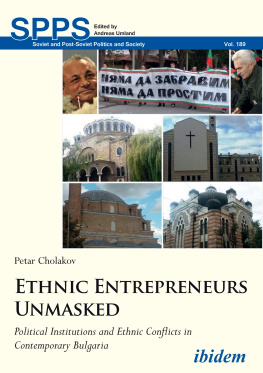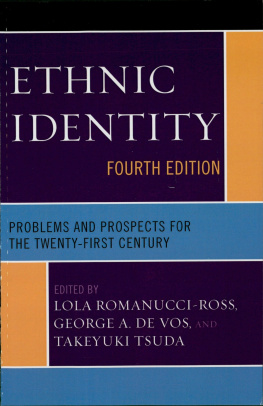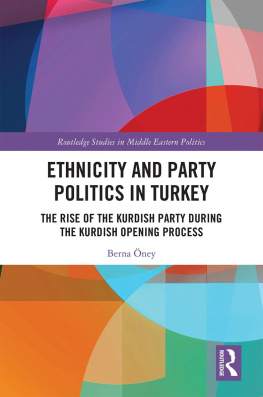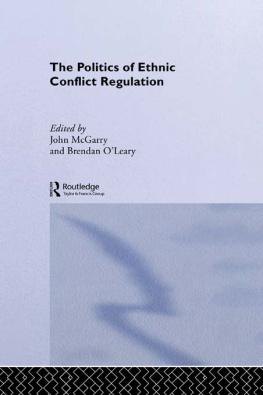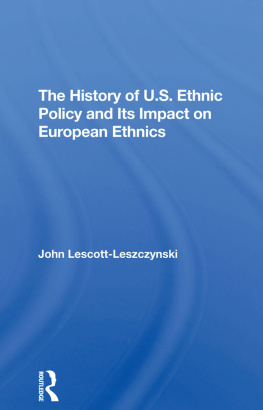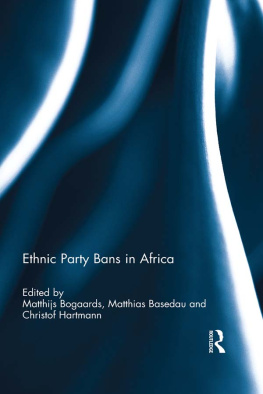ibidem Press, Stuttgart
Inhaltsverzeichnis
To my daughter Elena
List of Figures and Tables
Figures
1. Discrimination against Roma
2. The scope of state functions
3. Strength of state institutions and scope of state functions
4. Comparison between six states in 2013, based on WGI (Graph View)
5. Votes for the MRF in the elections for BNA, 19912014
6. Fears of the MRF voters
7. Votes for the main PRR parties
8. Votes for Ataka, NFSB, and MRF in the parliamentary
elections (2005, 2009, 2013, 2014)
9. Social distances (2016)
10. Social distances (2008 and 2016)
11. Criminal activities among the main ethnic groupsthefts
12. Criminal activities among the main ethnic groups
robberies
13. Criminal activities among the main ethnic groupspremeditated murders
14. Criminal activities among the main ethnic groups
batteries
15. Criminal activities among the main ethnic groupsrapes
16. Social distances. Do you agree or disagree with each of
the following statements?
Tables
1. Main ethnic groups in Bulgaria since 1878
2. Main sources of income for Roma households
3. Comparison between six states in 2013, based on WGI
4. Control of corruption in six states in 1996, 2003, 2008, 2013
5. Ethnic profile of the political parties in the Bulgarian
National Assembly in 2009
6. Crimes and Roma suspects
7. Number of complaints lodged with the Commission for Protection Against Discrimination per year
8. Use of force by the Bulgarian police by years
Abbreviations
Abbreviations of political parties and organizations |
Abbreviation in English | Full name of the organization in English | Abbreviation in Bulgarian | Full name of the organization in Bulgarian |
ABR | Alternative for Bulgarian Revival |
ASP | Alternative Socialist Party |
BAPU | Bulgarian Agrarian Peoples Union |
BAPU
Nikola Petkov | Bulgarian Agrarian Peoples
Union
Nikola Petkov |
BAPU United | Bulgarian Agrarian Peoples Union United |
BDF | Bulgarian Democratic Forum |
BEL | Bulgarian European Left |
BNRP | Bulgarian National Radical Party | - |
BNU | Bulgarian National Union |
BSDP | Bulgarian Social Democratic Party |
BSP | Bulgarian Socialist Party |
DLP | Democratic Labor Party |
DOST | Democrats for Responsibility Solidarity and Tolerance |
DROM | Movement for an Equal Public Model |
FF | Fatherland Front |
IMROBNM | IMROBulgarian National Movement |
MBC | Movement Bulgaria of the Citizens |
MRF | Movement for Rights and Freedoms |
NCPPI | National Committee for Protection of Peoples Interests |
NFSB | National Front for the Salvation of Bulgaria |
NMSP | National Movement for Stability and Progress |
ODS | United Democratic Forces |
OLJ | Order, Legality, and Justice | , |
PPFD | Peoples Party Freedom and Dignity |
PROUD | People for Real, Open and United Democracy |
PU | Peoples Union |
TNLMB | Turkish National Liberation Movement in Bulgaria | - |
UBNL | Union of Bulgarian National Legions |
UDF | United Democratic Forces |
UDF
Center | Union of the Democratic Forces Center |
UFD | Union of Free Democrats |
UNPP | United
National
Progressive Party |
UNS | Union for National Salvation |
UYNL | Union of Youth National Legions |
Other important abbreviations |
Abbreviation in English | Full name in English | Abbreviation in Bulgarian | Full name in Bulgarian |
BHC | Bulgarian Helsinki Committee |
BNA | Bulgarian National Assembly |
CEC | Central Electoral Commission |
CPAD | Commission for Protection against Discrimination |
ECHR | European Convention on Human Rights | ECHR |
ECtHR | European Court of Human Rights |
FYROM | Former Yugoslav Republic of Macedonia |
GSI | Global Slavery Index |
NAP-DRI | National Action Plan for the pan-European Initiative Decade of Roma Inclusion | - |
NCCEDI | National Council for Cooperation on Ethnic and Demographic Issues |
NCCEII | National Council for Cooperation on Ethnic and Integration Issues |
NCEDI | National Council on Ethnic and Demographic Issues |
PADA | Protection against Discrimination Act |
PRR | Populist Radical Right |
SAC | Supreme Administrative Court |
SANS | State Agency National Security |
SFRY | Socialist Federal Republic of Yugoslavia |
WGI | Worldwide Governance Indicators (World Bank) |
Introduction
The relative ethnic peace which Bulgaria has enjoyed in the recent decades is among the few remaining bastions of national self-confidence. Amid bitter antagonism, bloodshed, and financial crises, which devastated many countries after the collapse of the Communist bloc, the sanctity of interethnic accord has, in general, been revered in Bulgaria. Its preservation is possible because the political system, despite its multiple drawbacks, is still able to tame the flashing sparks. Not only the limited comprehensive research on the topic but also the current affairs testify to the relevance of this book, dedicated to the role of political institutions in ethnic conflicts in Bulgaria after 1989. As I am writing these lines, Lyutvi Mestan, the leader of the newly formed ethnic party Democrats for Responsibility Solidarity and Tolerance (DOST), The events in Katunitsa, Orlandovtsi, Garmen, and Radnevo indicate that the clashes and physical violence between Bulgarians and Romani, who remain subjected to social exclusion and marginalization, are on the raise. In addition, there are numerous other less visible and often ignored outbursts of hostility on ethnic grounds which happen on a daily basis. The issues discussed in the pages that follow are even more pertinent when we consider the international context. The principles and values on which the European Union (EU) is built are challenged by the constant migrant flow from Syria, Iraq, Afghanistan, and other failing states. At the same time, the increasingly menacing shadow of terrorism revealed its poisonous tentacles in the attacks in Madrid (2004), London (2005), Burgas (2012), Paris (2015), Brussels, Istanbul, Nice, Wrzburg, Ansbach, Munich, and Berlin (2016).

